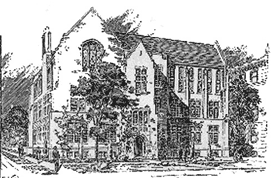Centennial Symposium: Origins of Marquette Law School
 This afternoon in Eisenberg Hall, three distinguished scholars kicked off the first installment of the Centennial Symposia celebrating the 100th anniversary of Marquette University’s acquisition of the Milwaukee Law School and the Milwaukee University Law School. (A podcast is here.) This session, entitled “The Origins of Marquette University Law School,” featured Joseph A. Ranney, a legal historian, shareholder in DeWitt Ross & Stevens S.C., and adjunct professor at the Law School; Professor J. Gordon Hylton of the Law School (who is organizing the symposia); and Dr. Thomas J. Jablonsky, the Harry G. John Professor of Urban Studies at Marquette.
This afternoon in Eisenberg Hall, three distinguished scholars kicked off the first installment of the Centennial Symposia celebrating the 100th anniversary of Marquette University’s acquisition of the Milwaukee Law School and the Milwaukee University Law School. (A podcast is here.) This session, entitled “The Origins of Marquette University Law School,” featured Joseph A. Ranney, a legal historian, shareholder in DeWitt Ross & Stevens S.C., and adjunct professor at the Law School; Professor J. Gordon Hylton of the Law School (who is organizing the symposia); and Dr. Thomas J. Jablonsky, the Harry G. John Professor of Urban Studies at Marquette.

